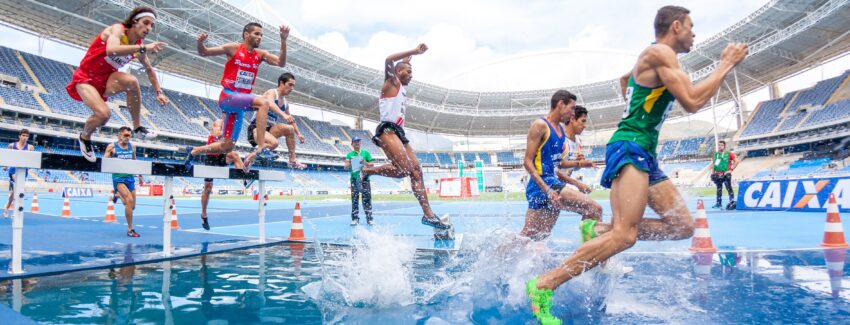This article was originally published in the Massachusetts Senior Games Program Book 2022.
You’ve practiced hard and psyched yourself up for the big event, preparing for a super performance. You’re ready… except there’s just one thing lacking proper nutrition that will keep you going throughout the competition! The first and most important thing to remember in designing a pre-event meal is to stick with foods that your body is familiar with. The day of the big game is no time to start experimenting with new meals. Some of the most important reasons for eating well before an event are to prevent hypoglycemia (low blood sugar) and its symptoms such as dizziness, nausea, fatigue, muscle weakness, blurred vision, indecisiveness. Another important point is to settle the stomach by absorbing gastric juices and preventing the distraction of hunger. Don’t forget to top off your muscle glycogen stores for maximal energy, and to give the peace of mind that comes with knowing your body is well fueled.
Some guidelines for choosing your pre-event meal are:
Eat adequate high carbohydrate meals every day to keep glycogen stores full and make the most of your training sessions.
-Allow at least 3-4 hours digestion time for a large meal, 2-3 for a smaller meal, 1-2 for blended or liquid meals, < 1hr for a small snack.
-If you are participating in very intense exercise, you may want to allow a little extra time.
-If your stomach is easily upset, try liquid meals (shakes, blended meals, etc.).
-If you eat less than 1 hour before the event, be sure to snack on any “tried and true” low fat, high carbohydrate snack.
-Limit high fat proteins such as cheese and peanut butter – they take a long time to empty from the stomach and will slow you down.
-Drink extra water the day before, have 2-3 glasses.
-Before bed and 1-3 glasses 5-10 minutes before the event and remember to re-hydrate after the event.
You should replace every pound of weight lost with at least 2 cups of water, or 3 cups if you have another event on the same day. Sports drinks are recommended for events lasting longer than one hour to replenish electrolytes lost through sweating and give your muscles the carbohydrates they need to keep working hard. Despite the best of intentions, some athletes are unable to eat before events. Studies show as many as 30-50% of athletes have an upset stomach if they eat before an event.
When to Eat
Exercising on a full stomach is not ideal. Food that remains in your stomach during an event may cause stomach upset, nausea, and cramping. To make sure you have enough energy, yet reduce stomach discomfort, you should allow a meal to fully digest before the start of the event. This generally takes 1 to 4 hours, depending upon what and how much you’ve eaten. Everyone is a bit different, and you should experiment prior to workouts to determine what works best for you. If you have an early morning race or workout, it’s best to get up early enough to eat your pre-exercise meal. If not, you should try to eat or drink something easily digestible about 20 to 30 minutes before the event. The closer you are to the time of your event, the less you should eat. You can have a liquid meal closer to your event than a solid meal because your stomach digests liquids faster.
What to Eat
Because glucose is the preferred energy source for most exercise, a pre-exercise meal should include foods that are high in carbohydrates and easy to digest. This includes food such as pasta, fruits, breads, energy bars and drinks.
Planning
Planning is essential if you are competing in an all-day event, such as track meets or other tournaments. Consider the time of your event, the amount of your meal and the energy required. Also, be aware of the amount of fluid you consume. You should plan ahead and prepare meals and snacks that you have tried before and know will sit well with you. Do not experiment with something new on the event day.
Suggested Pre-Exercise Foods
Eating before exercise is something only the athlete can determine based upon experience, but some general guidelines include eating a solid meal 4 hours before exercise, a snack or a high carbohydrate energy drink 2 to 3 hours before exercise, and fluid replacement (sports drink) 1 hour before exercise.
1 Hour or less before Competition
- Fruit or vegetable juice such as orange, tomato, or V-8, and/or
- Fresh fruit such as apples, watermelon, peaches, grapes, or oranges and/or
- Energy gels
2 to 3 Hours before Competition
- Fresh fruit
- Fruit or vegetable juices
- Bread, bagels
- Low-fat yogurt
- Sports drink
3 to 4 Hours before Competition
- Fresh fruit
- Fruit or vegetable juices
- Bread, bagels
- Pasta with tomato sauce
- Energy bar
- Cereal with low-fat milk
- Low-fat yogurt
- Toast/bread with limited peanut butter, lean meat, or low-fat cheese
- 30 oz of a sports drink
Focus your efforts on consistency, daily calorie intake, food quality and sustainability. When you’ve got all the basics down, then you may wish to move your attention to more advanced methods like nutrient timing.

